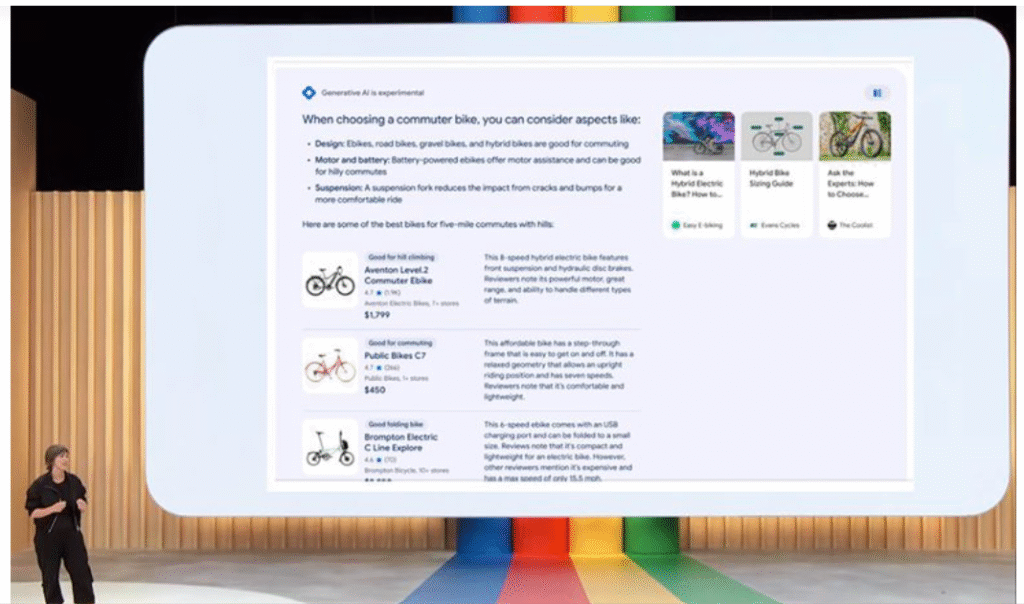
The world of search engine optimization has undergone a dramatic transformation in 2025. With artificial intelligence reshaping how people search for information and how search engines deliver results, SEO professionals must adapt their strategies to stay competitive. This comprehensive guide explores the key trends, challenges, and opportunities defining SEO in 2025.
The AI Revolution in Search

Source: Google Keynote (Google I/O ’23)
SGE and Conversational Search
Google’s Search Generative Experience (SGE) has fundamentally changed how search results are presented. Traditional blue links now compete with AI-generated summaries that appear at the top of search results. This shift means SEO strategies must focus on:
- Answer-focused content: Creating comprehensive, authoritative content that AI can confidently cite
- Structured data implementation: Using schema markup to help AI understand and extract key information
- Featured snippet optimization: Crafting content that’s likely to be selected for AI summaries
Voice and Visual Search Dominance
Voice search queries have become increasingly sophisticated, with users asking complex, conversational questions. Visual search through tools like Google Lens has also gained significant traction, particularly in e-commerce and local search.
Core SEO Strategies for 2025
1. E-A-T Evolution: Experience, Expertise, Authoritativeness, Trust
Google’s E-A-T guidelines have evolved to emphasize real-world experience alongside traditional expertise signals. Success requires:
- Author credibility: Showcasing credentials, experience, and thought leadership
- Content depth: Creating comprehensive resources that demonstrate genuine expertise
- Trust signals: Building robust backlink profiles and maintaining transparent business practices
- User experience metrics: Focusing on engagement signals and user satisfaction
2. Technical SEO Excellence
Technical foundation remains crucial, with new emphasis on:
- Core Web Vitals: Page speed, interactivity, and visual stability continue to be ranking factors
- Mobile-first indexing: Ensuring mobile versions are fully optimized
- JavaScript SEO: Proper handling of dynamic content and single-page applications
- International SEO: Implementing hreflang and geo-targeting for global reach
3. Content Strategy Revolution
Content creation in 2025 requires a multi-faceted approach:
- Topic clusters: Organizing content around pillar topics and supporting subtopics
- User intent mapping: Understanding and addressing different search intentions
- Content freshness: Regular updates and new perspectives on existing topics
- Multi-format content: Combining text, video, audio, and interactive elements
Emerging Trends and Technologies
AI-Powered SEO Tools
Advanced AI tools are revolutionizing SEO workflow:
- Automated keyword research: AI identifies semantic relationships and content gaps
- Content optimization: Tools provide real-time suggestions for improving content performance
- Predictive analytics: Forecasting trends and algorithm changes
- Personalization: Creating targeted content for specific audience segments
Zero-Click Searches and Featured Snippets
With more searches ending without clicks, SEO strategies must adapt:
- Brand visibility: Ensuring brand mentions in AI-generated responses
- Local SEO: Optimizing for local pack results and Google Business Profile
- Knowledge panel optimization: Claiming and optimizing entity information
Video and Interactive Content
Video content dominance continues with new opportunities:
- YouTube SEO: Optimizing for YouTube’s algorithm and features
- Video snippets: Creating content that appears in video search results
- Interactive elements: Incorporating polls, quizzes, and calculators for engagement
Industry-Specific Considerations
E-commerce SEO
Online retail faces unique challenges:
- Product schema: Implementing detailed product markup for rich snippets
- Visual search optimization: Optimizing product images for Google Lens
- User-generated content: Leveraging reviews and Q&A for long-tail keywords
- Local inventory: Connecting online and offline inventory for local searches
Local SEO
Local businesses must focus on:
- Google Business Profile optimization: Complete, accurate, and regularly updated profiles
- Local citations: Consistent NAP (Name, Address, Phone) across directories
- Review management: Encouraging and responding to customer reviews
- Hyperlocal content: Creating content relevant to specific neighborhoods and communities
Algorithm Updates and Ranking Factors
Recent Algorithm Changes
2025 has seen several significant updates:
- Helpful Content Update: Rewarding content created for users, not search engines
- Link Spam Update: Penalizing manipulative link-building practices
- Product Reviews Update: Emphasizing authentic, experience-based reviews
Key Ranking Factors
Current ranking factors include:
- Content quality and relevance: Comprehensive, well-researched content
- User engagement signals: Time on page, bounce rate, and return visits
- Technical performance: Site speed, mobile-friendliness, and security
- Authority signals: Quality backlinks and brand mentions
Measuring Success in 2025
Beyond Traditional Metrics
SEO measurement has evolved beyond rankings and traffic:
- Brand visibility: Monitoring brand mentions in AI-generated responses
- Topic authority: Tracking rankings across topic clusters
- User satisfaction: Analyzing engagement and conversion metrics
- Share of voice: Measuring presence in featured snippets and knowledge panels
Tools and Analytics
Essential tools for 2025 SEO:
- Google Search Console: Monitoring performance and technical issues
- Google Analytics 4: Understanding user behavior and conversions
- Third-party SEO tools: Comprehensive keyword research and competitor analysis
- AI-powered platforms: Automated insights and optimization recommendations
Challenges and Opportunities
Current Challenges
- Algorithm volatility: Frequent updates requiring constant adaptation
- Increased competition: More businesses investing in SEO
- AI content detection: Balancing AI assistance with authentic content creation
- Privacy regulations: Adapting to cookieless tracking and privacy laws
Emerging Opportunities
- Niche expertise: Specialized knowledge becomes more valuable
- Voice search optimization: Early adoption advantages
- Local market dominance: Opportunities for smaller businesses
- AI-human collaboration: Combining AI efficiency with human creativity
The Future of SEO
Predicted Developments
Looking ahead, several trends will likely shape SEO:
- Increased AI integration: More sophisticated search experiences
- Personalization: Highly customized search results based on user behavior
- Multi-modal search: Combining text, voice, and visual search
- Real-time optimization: Dynamic content adaptation based on performance
Preparing for Change
Successful SEO in 2025 requires:
- Continuous learning: Staying updated with industry changes
- Flexible strategies: Adapting quickly to algorithm updates
- User focus: Prioritizing user experience over technical optimization
- Data-driven decisions: Using analytics to guide strategy
Conclusion
SEO in 2025 represents both challenges and opportunities. While AI has transformed the search landscape, the fundamental principles of creating valuable, user-focused content remain constant. Success requires balancing technical optimization with authentic content creation, staying agile in response to algorithm changes, and maintaining a long-term perspective on building brand authority.
The organizations that thrive in this new environment will be those that embrace AI as a tool while maintaining the human touch that creates truly valuable content. By focusing on user needs, technical excellence, and authoritative content creation, SEO professionals can navigate the complexities of 2025 and build sustainable organic growth.
